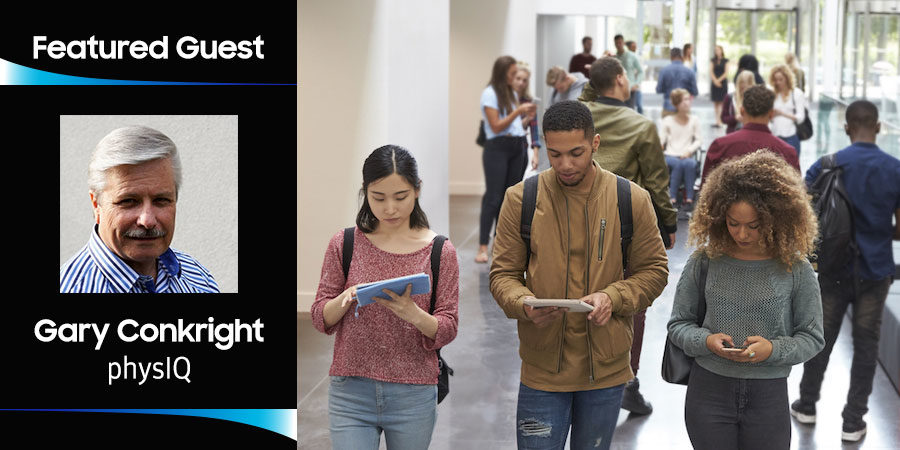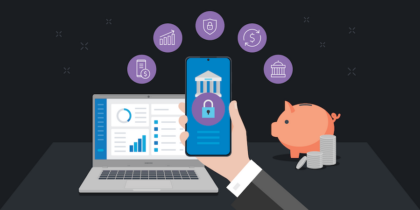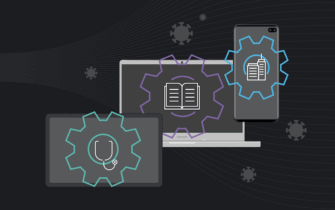Editor’s Note: This conversation is part of our ongoing “Future State Of” series. It has been edited for length and clarity.
The COVID-19 pandemic has profoundly impacted the ways we come together. Interactions that once seemed routine — a professor addressing a lecture hall of students, a first responder treating a patient — carry added complexity with the need for novel safeguards. Many companies have worked to solve these challenges, including physIQ, a tech innovator in the personalized healthcare analytics space.
Taher Behbehani, GM and SVP of Samsung B2B, sits down with physIQ CEO Gary Conkright to discuss getting college students back in class safely and other ways his company’s technology is addressing COVID-related issues.
Taher Behbehani: Hi Gary, thanks for speaking with me today. I know that Samsung is partnering with physIQ on a back-to-campus program at Purdue. Tell me a bit about the project and how it’s going.
Gary Conkright: Purdue reached out to us to see if one of the wearable biosensors validated for our artificial intelligence (AI)-enabled platform could help with their back to campus program. Together we chose the Galaxy Watch Active2 from Samsung for its long-term wearability and high-quality data streams. We are currently in a pilot phase and are quite optimistic that this solution can be used to provide peace of mind to high-risk faculty and staff that their health status is being monitored with state-of-the-art and reliable technology.
TB: How do you hope that the insights you get from this project will help schools in general address issues related to returning to work?
GC: The Purdue project could demonstrate the value of our solution, not just for faculty but students and staff as well. This can then be rapidly scaled to other colleges and schools, as well as to businesses where employees regularly come into contact with the public that could be infectious. Most of us wear watches, so wearing a smartwatch which is collecting physiological data processed with FDA-cleared AI is a strategy for getting the U.S. and other countries back to work.
TB: Clinical trials are obviously of major importance right now. How is physIQ focusing its efforts in that area?
GC: Several of our pharma clients are fully engaged developing and testing both vaccines and therapies. We are thrilled to be working with the Henry Jackson Foundation for Advanced Military Medicine as part of the U.S. Department of Defense’s efforts to learn about COVID and advance the development of a vaccine. Military readiness is a national security issue, and we are honored to be part of that effort with our accelerateIQ product.
TB: How has COVID impacted your work in the clinical trials business overall?
GC: We work with six of the top 20 global pharma companies and several of the world’s largest contract research organizations (CROs). They are all telling us the same thing: Clinical trials as we know it will never come back. Patients who could sign up to be a study subject are no longer willing to travel to a hospital or clinic to sign up or return every six weeks for vitals and to report symptoms. All of that can be done with our accelerateIQ virtual trial platform, and we even ship the monitoring kits directly to the subject’s home, enroll them over the phone and monitor for compliance. More data means more insight into how a therapy is impacting a patient, and virtual trial makes it easier and safer for the patient, especially during a pandemic.
TB: Samsung is seeing significant spikes in our products and services related to the new normal around working remotely. Are you seeing this new normal making remote digital healthcare monitoring more appealing and acceptable?
GC: Absolutely. Much has been written about how slow historically the U.S. healthcare system has been in the adoption of technology to deliver clinical care. The necessities for social distancing brought about by COVID has forced providers to use many readily available technologies. As a result, we have seen a significant increase in televisits. The traditional paradigm of the patient traveling to see the physician was for the convenience of the physician, and with televisits, which is much more focused on the convenience of the patient, I doubt anyone will be interested in putting the genie back in the bottle.
But while televisits are more convenient, they do very little to improve healthcare delivery. To move from reactive “sickcare,” where a patient is treated in a hospital when the disease becomes life-threatening, to proactive “healthcare” where interventions could result in the avoidance of a hospitalization, clinicians need data that can be easily collected with wearable sensors and processed with AI to provide near ICU-quality monitoring in order to maintain health outside the hospital. This is why we are so excited to see the adoption of continuous remote patient monitoring (cRPM) solutions like our pinpointIQ as clinicians by necessity need to attend to chronically ill patients who cannot visit hospitals and clinics due to COVID. We believe COVID has accelerated cRPM adoption by five years.
TB: Obviously many people cannot work from home at this time, including our front-line healthcare workers. How are you using your technology to help them?
GC: Most experts are predicting a second wave of COVID this fall that could dwarf our current situation. This will likely cause us to use or rebuild temporary healthcare facilities to deal with the patient surge. Our Ebola work in Sierra Leone with USAid, the CDC and Scripps demonstrated that a small number of healthcare workers could monitor a large volume of very sick patients remotely without having to enter the quarantine areas wearing personal protective equipment (PPE) and still provide excellent care. With COVID, every vital sign reading exposes our healthcare heroes to risk, and our technology can be rapidly deployed and scaled to minimize that exposure.
TB: At Samsung, we are seeing a lot of interest in our security products and services with the increase in remote working. How are you addressing security as remote health monitoring increases?
GC: Great question — and that’s the reason we are using Samsung Knox to provide the highest level of security during data transport, from the biosensor to our cloud. In the cloud we have designed the platform from the ground up to provide the data privacy, integrity and reliability which healthcare demands and the patient deserves.
TB: I know that physIQ’s technology is focused on AI. How can AI specifically help us thwart the next pandemic?
GC: I’m not sure we can thwart the next pandemic, but we are working hard to help scientists and physicians understand and manage it. As with patients with heart failure and other chronic illnesses that we help clinicians manage, COVID symptoms are often very subtle at first, to the extent the patient is often not even aware they have the virus. And single-point vital sign measurements taken a few times a day, like temperature or oxygen, are often lagging indicators. The earliest or leading indicators are usually very subtle changes in heart rate or respiration rate which as we all know changes minute to minute as we go about our daily routines. Without a personalized baseline for each patient, only available using AI, it is impossible to detect these presymptomatic changes. Providing a day or more of advance warning can make the difference between good and bad outcomes and allows for more rapid isolation to prevent its spread.
TB: This has been a great conversation. Is there anything else we haven’t touched on that you feel is important?
GC: I find the esprit de corps that has developed with all of our partners, to join forces and address this crisis of a lifetime is truly inspiring. That very much includes Samsung as we work together to leverage technology to deal with this pandemic and whatever the new normal will be. Exactly what that will look like is uncertain, but I’m confident it will certainly involve greater use of technology, and at least in healthcare will result in better outcomes, higher quality of life and a more cost-efficient ecosystem.
Explore the ways Samsung is supporting the transition to remote work. And keep up to date with the latest announcements and insights by following Taher Behbehani on Twitter.








